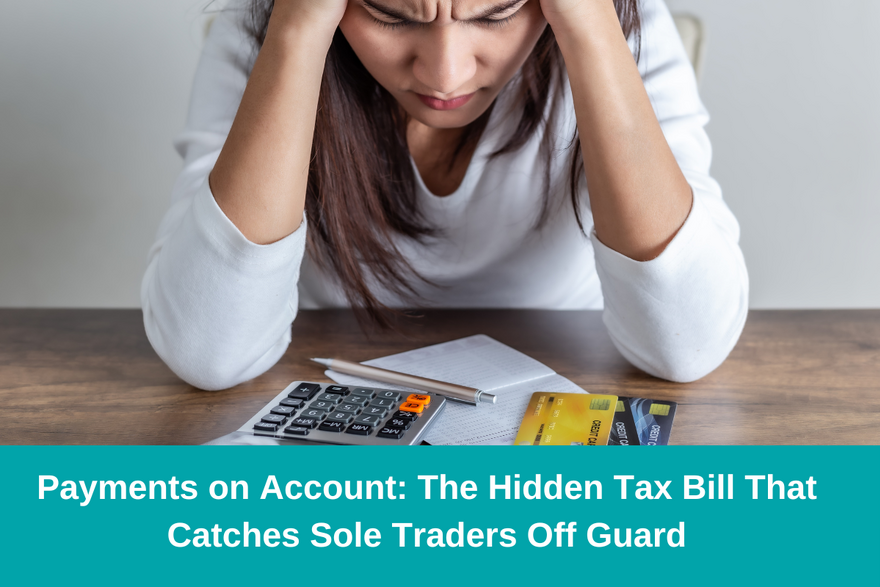
If you’re a sole trader, you probably expect to pay your tax bill in January when you submit your Self-Assessment. But what if I told you that many sole traders end up paying twice as much as they expected—not just for the tax they owe, but for next year’s tax as well?
This is where Payments on Account catch people out.
And just when you think you’ve handled your tax bill in January, HMRC wants another payment in July—and then, surprise! Another one the following January!
Let’s break it down so you’re never caught off guard again.
What Are Payments on Account?
Payments on Account are advance payments towards your next tax bill. HMRC assumes that you’ll earn a similar amount next year as you did this year, so instead of waiting until next January, they make you pay half of next year’s bill upfront—in two instalments:
First Payment: January 31st (along with your tax bill for the previous year)
Second Payment: July 31st
Each payment is 50% of your last tax bill, effectively pre-paying for the next year.
Why Do People Get Caught Out?
Because most people assume that January is the only tax payment they’ll have to make, when in reality:
You pay for last year’s tax (the amount due based on your Self-Assessment return).
You pay an extra 50% as your first Payment on Account for next year.
Then in July, you pay another 50%.
The real shocker? Next January, you might still owe more tax if you earned more than expected!
The January Tax Bill Surprise
Let’s say you’re new to Self-Assessment and 2024 is the first year you've made a decent profit. Here’s what happens:
You file your 2023/24 tax return in January 2025.
Your tax bill for 2023/24 is £6,000.
But instead of just paying £6,000, HMRC asks for £9,000!
£6,000 for this year’s tax
£3,000 extra (50% of your tax bill) as your first Payment on Account for 2024/25
Then, in July 2025, you have to pay another £3,000.
That’s £9,000 in tax in your first year of Self-Assessment—when you were expecting £6,000.
The problem gets worse if your income increases in the following tax year because then, in January 2026, you might have to pay the difference on what you actually owe PLUS another payment on account for the following year.
Do You Always Have to Make Payments on Account?
No, there are two situations where Payments on Account don’t apply:
If your last tax bill was less than £1,000.
If more than 80% of your tax was already deducted at source (e.g., you’re also employed and paid through PAYE).
For everyone else, it’s standard.
Can You Reduce Your Payments on Account?
Yes—but be careful.
If you expect to earn less next year, you can apply to reduce your Payments on Account. You do this via:
Your Self-Assessment tax return
Your HMRC online account
A paper form (SA303) submitted to HMRC
However, if you reduce your payments too much and still owe tax at the end of the year, HMRC will charge interest on the shortfall.
If you’re unsure, it’s better to leave the payments as they are and get a refund later than to underpay and get stung with penalties.
How to Avoid the Payments on Account Shock
Here’s how to make sure your tax bill doesn’t take you by surprise:
Set aside money regularly – A good rule of thumb is to put aside 25-30% of your income for tax throughout the year.
Check your Payments on Account – When you file your tax return, check what’s due in January and July.
Plan for the January cycle – If your income is increasing, expect a balancing payment in January alongside your first new Payment on Account.
Use a separate tax savings account – Move money into a separate account so it’s there when HMRC comes knocking.
Get professional advice – A good accountant can help you forecast your tax bill so there are no nasty surprises.
Final Thoughts
Many sole traders are caught out by Payments on Account, especially in their first year of making decent profits. But now you know how it works, you can plan ahead and avoid the stress.
If you're unsure how much to set aside, or you need help reducing your tax bill legally, get in touch.
Tax shouldn’t be a shock—it should be part of your plan. Let’s make sure you’re in control of yours.


Comments